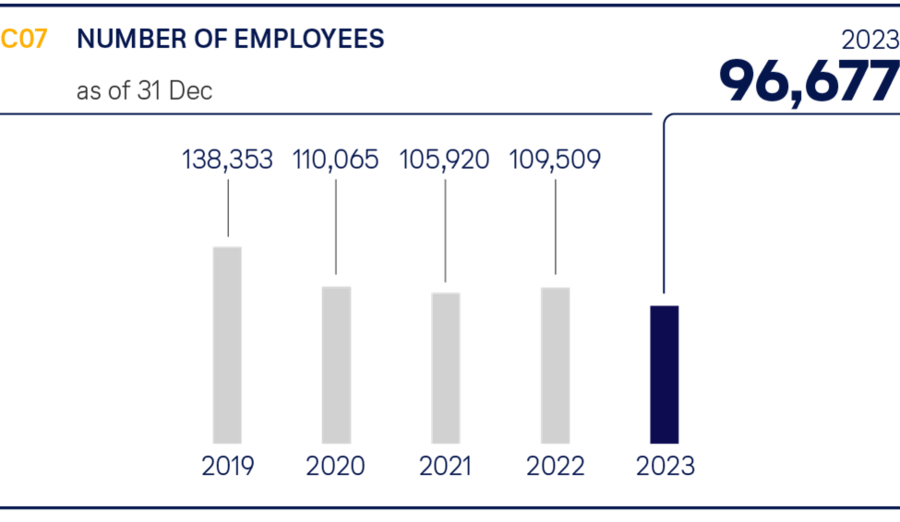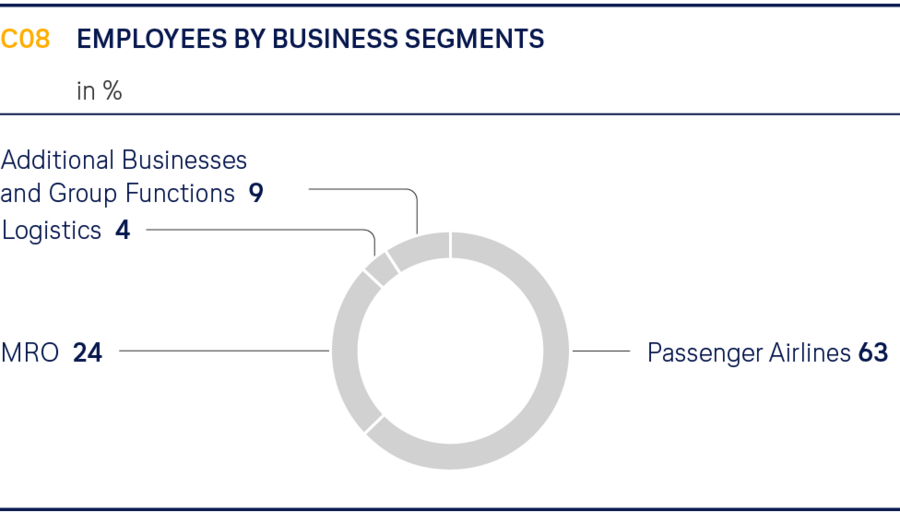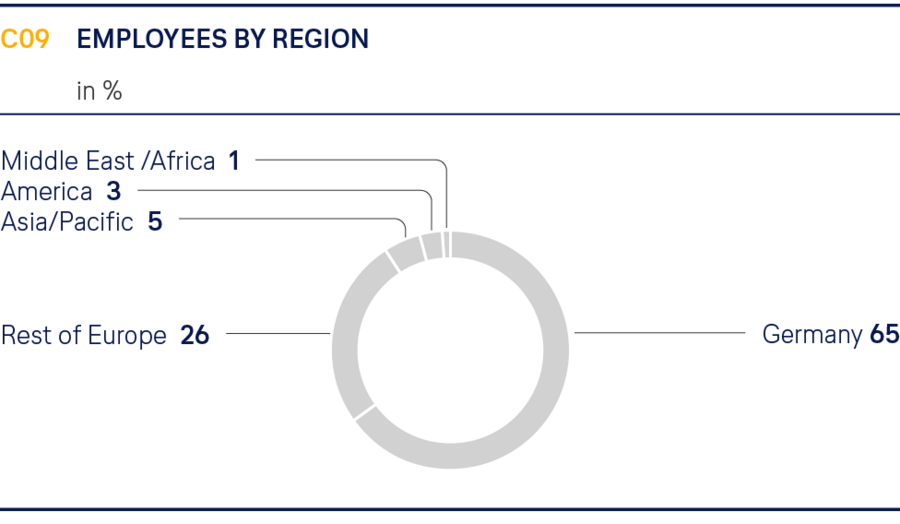Employees



Human resources management prepares the Company for the future and creates prospects for employees
The current geopolitical, economic and demographic developments, as well as existing megatrends, have a material influence on the performance of the Lufthansa Group. With their know-how and wide-ranging talents, our employees are and will remain one of the key success factors for the Lufthansa Group. They ensure reliable flight operations and efficient administrative processes in an air traffic system characterised by operational challenges and volatility. Furthermore, they largely define the passenger experience and embody the aspiration of Lufthansa Group Airlines to be a premium brand.
Corporate culture plays a key role here, both for the Company’s commercial success and for the engagement and welfare of employees. It reflects the needs of society, employees and the Company and its shareholders, and is taken into account in operational decisions. The Lufthansa Group continues to attach great importance to offering attractive perspectives for future employees and to retaining existing staff in the long term. With these goals in mind, the Lufthansa Group has initiated the Cultural Journey programme, which in addition to promoting the various cultures specific to different societies, also aims to strengthen its own corporate culture.
The “involve me!” employee survey carried out across the Company makes it possible to identify strategic action areas that are addressed by the Group HR strategy. This centres on a holistic approach in relation to equal opportunity and diversity, training opportunities for all employees, intensive promotion of talent and a balance between work and private life. It also includes a wide variety of careers that enable employees to take on different roles. The Lufthansa Group aspires to a fair and partnership-based relationship with its employees, to become an even more attractive employer and to retain talent in the long term. ↗ Combined non-financial declaration/Employee concerns
Number of employees down in the reporting year due to disposal of LSG Group
At year-end 2023, the Lufthansa Group had 96,677 employees worldwide (previous year: 109,509). This meant that the number of employees decreased by 12,832, or 12%. The decline is principally due to the sale of the LSG Group and the related departure from the Group of more than 20,000 staff. New recruitment only partially made up for the effect of selling the LSG Group, natural staff turnover and retirement. The number of employees was 41,676 or 30% lower than before the crisis (31 December 2019: 138,353).
Translated into full-time positions, the Group had 80,583 employees at the end of 2023 (previous year: 93,690). This represents a decline of 13,107, or 14% against the previous year.
In Germany, the Group had 63,176 employees: this is 3,881, or 7%, more than in the previous year (previous year: 59,295). The increase was driven by extensive recruitment. The Group’s employees in Germany account for 65% of its overall workforce (previous year: 54%). The number of employees outside Germany decreased by 16,713, or 33%, to 33,501 (previous year: 50,214).
As of the reporting date, the average age of the workforce was 42.6 years (previous year: 42.9 years). Average seniority was 14.2 years (previous year: 13.4 years). 35% of employees worked part-time in the reporting year (previous year: 30%). The fluctuation rate fell to 7%, largely thanks to the disposal of the LSG Group (previous year: 15%).
At year-end, 1,640 apprentices were in training for around 30 occupations and various combined degree courses offered by the Lufthansa Group worldwide (previous year: 1,245).
Extensive recruitment measures are also planned for the 2024 financial year, in order to attract highly motivated staff with the right skills and abilities. The focus will in particular be on the operational areas, as well as on IT, finance and administration.
Important agreements signed with collective bargaining partners
In the 2023 financial year, the Lufthansa Group, represented by the relevant industry associations or its subsidiaries, concluded a large number of new wage agreements with its collective bargaining partners. This meant that, at the end of 2023, collective bargaining agreements had been concluded and were in force for all of the workforce of Deutsche Lufthansa AG covered by these agreements and for the vast majority of employees involved in the Lufthansa Group’s main companies. ↗ Opportunities and risk report, Human resources
In the reporting year, the Employers’ Federation for Air Transport Companies (AGVL) reached a wide-ranging agreement with the Vereinigung Cockpit pilots’ union (VC) for Lufthansa Airlines and Lufthansa Cargo. It includes both elements of the wage settlement, such as the increase in basic pay of at least 18% over the duration of the agreement, a standardised remuneration structure and the payment of an inflation compensation premium, and elements of the framework agreement. Agreement was also reached on topics such as planning leisure time, flight service times and rest times. The new agreements run until at least 31 December 2026.
The framework agreement signed between the UFO trade union for cabin crew and AGVL for Deutsche Lufthansa AG on 31 October 2022 remains unchanged. The wage settlement also signed on 31 October 2022 was terminated by UFO.
On 4 August 2022, the Employers’ Federation for Air Transport Companies (AGVL) and the trade union Vereinigte Dienstleistungsgewerkschaft e.V. (ver.di) reached a new wage agreement for the roughly 20,000 ground staff covered by collective bargaining agreements in Germany, particularly at Deutsche Lufthansa AG, Lufthansa Technik AG and Lufthansa Cargo AG. This agreement was terminated as of 31 December 2023. Basic pay was increased in January 2023 by a fixed sum of EUR 125 or a linear increase of 2.5%. A further increase in basic pay by 2.5% took effect on this basis in July 2023.
In early 2023, a new wage agreement with a term of at least four years was signed for the pilots at SWISS. It includes an inflation offset of 2% and a wage increase of 2.3%. Agreements were also reached that make it easier to plan leisure time. SWISS signed another collective agreement with the cabin union kapers on 20 October 2023. As in the previous year, a wage adjustment was agreed for SWISS ground staff in Switzerland, which came to an average of 2% for 2024. Pension contributions by the employer were also raised by 1 percentage point.
Ongoing high inflation in 2023 meant that when the respective crisis packages came to an end, the collective bargaining partners at Austrian Airlines agreed on a collective wage increase of 11% from 1 March 2023 for commercial, technical and in-flight staff. An inflation offset premium was also paid and entry-level salaries (after the collective increase) were raised for some occupations.
The employees of Brussels Airlines in Belgium benefit from a statutory indexation arrangement. All of its employees thus received a 2% pay rise in 2023. A “cafeteria model” has also applied to some of the employees since 2021. It enables employees to pick individual social benefits from the Company. They are granted points for this purpose and can redeem them as they wish.
A new framework agreement was signed with the VC trade union for the pilots at Eurowings GmbH on 3 August 2023. Negotiations began in November 2023 on a replacement for the wage settlement terminated in March 2023. The outlines of a new framework and wage agreement were set with the trade union ver.di for the cabin staff at Eurowings GmbH. Collective agreements were also reached in Spain, Austria, Czech Republic and Sweden for cockpit and cabin crew at Eurowings Europe.
Developing a new partnership between social partners
Within the scope of its social and collective bargaining policies, the Lufthansa Group aims to define good working conditions and fair salary arrangements which strike a balance between the interests of employers and employees in every part of the Group. Longer-term agreements establish planning certainty for both sides. The agreements concluded in the reporting year achieved this in some contexts. They were helped above all by a common understanding of the current challenges, and a focused, constructive working relationship between the social and collective bargaining partners and the Lufthansa Group.